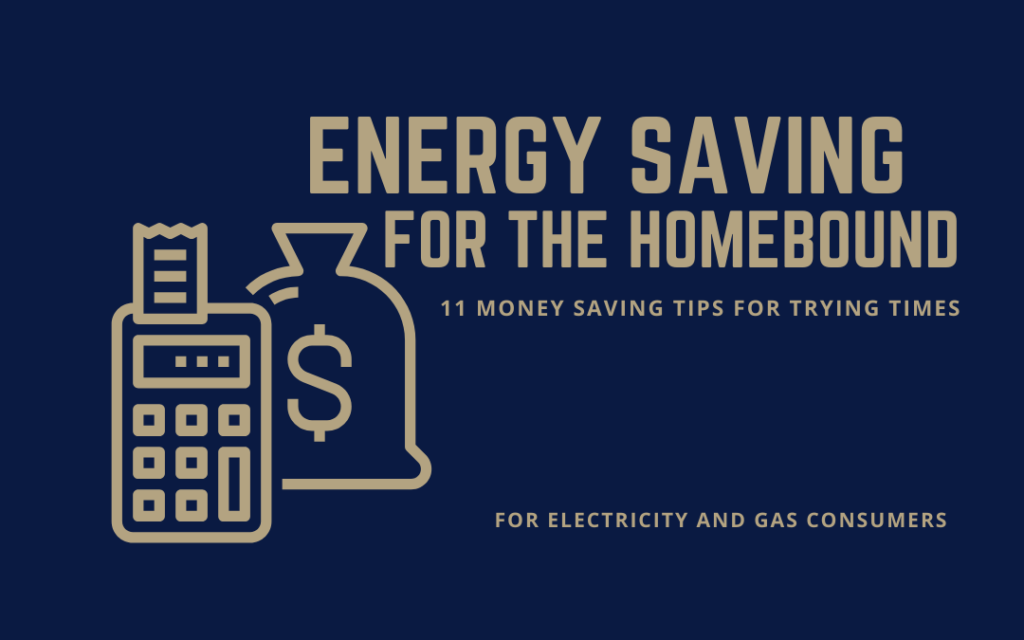Eleven tips to help you control your energy use during otherwise chaotic times.
________________________________________________
As a service to readers, we’ve assembled here our top 11 tips to save energy for the pandemic homebound. Many of these ideas may strike you as common sense, others will be counter-intuitive. But the experts — whether governmental sources, energy retailers or non-profits — agree that each can help you keep your electricity and gas bills under control during otherwise chaotic times.
- The Air Conditioner: The U.S. Department of Energy estimates that the average homeowner can save 3 percent on energy bills during the summer for every degree they turn up their AC thermostat. But you might want to ease into the adjustment gradually. Go up by a degree or two, leave it, and see how the new temperature impacts your
 budget and your comfort. The “auto” setting on your AC fan (as opposed to its “on” setting) also can help your system efficiently reach your desired temperature. The rules are slightly different for window units because the thermostats on them register the temperature only near the unit itself. This means you will have to rely on trial and error to get comfortable. If you have a window unit in your bedroom wait a half hour before going to sleep to turn it on so you don’t waste your money cooling down an empty room.
budget and your comfort. The “auto” setting on your AC fan (as opposed to its “on” setting) also can help your system efficiently reach your desired temperature. The rules are slightly different for window units because the thermostats on them register the temperature only near the unit itself. This means you will have to rely on trial and error to get comfortable. If you have a window unit in your bedroom wait a half hour before going to sleep to turn it on so you don’t waste your money cooling down an empty room. - Fans: Ceiling fans work great with AC units and typically allow users to hike their thermostats by three or four degrees without feeling much difference. Here’s a pro-tip: run your ceiling fan in reverse to push warm air from the ceiling toward the floor, and this creates a cooling updraft. Don’t forget to turn the fan off when you leave the room. Fans cool people, not rooms, and will themselves become a source of wasted energy if operated without discipline.
- Window Blinds: Use them. Experts say window blinds can reduce the sun’s heat in your home by half.
 The Dishwasher. Chances are that you’re cooking home now more than ever. But this means you probably also run your home dishwasher more — and dishwashers hog energy. To save money, run them with only full loads and use the automatic cool-dry cycle setting. If you don’t have that function on your unit, then simply turn the unit off after the final rinse and manually dry your dishes or allow them to air dry. Pro tip: rinsing dishes that go into the dishwasher anyway will needless wastes your electricity and your water. Scrape the dishes instead.
The Dishwasher. Chances are that you’re cooking home now more than ever. But this means you probably also run your home dishwasher more — and dishwashers hog energy. To save money, run them with only full loads and use the automatic cool-dry cycle setting. If you don’t have that function on your unit, then simply turn the unit off after the final rinse and manually dry your dishes or allow them to air dry. Pro tip: rinsing dishes that go into the dishwasher anyway will needless wastes your electricity and your water. Scrape the dishes instead.- Doing Laundry: It’s always best to run the clothes washer in the evening or early morning, and not during the hottest part of the day. The reason: large appliances like the clothes washer and clothes dryer further heat your home and cause the AC to work harder. As with the dishwasher, avoid using the clothes washer and dryer without a full load, and — if possible — run loads back to back. This way you take advantage of the heat buildup for more efficient use.
- Cooking. Microwaves and slow cookers are more efficient than ovens; glass and ceramic pans retain heat better than metal ones. Also, cooking outside helps save both on the cost of running your home AC and your oven.
- Gardening. What greater excuse to get caught up on your gardening than a COVID-19 stay-at-home order? But while you’re working on the lawn, take a look at you outdoor AC unit to clear it of any obstructing plants. This will allow our AC unit to work more efficiently.
- Open windows. Keeping them open on opposite sides of your home can create a cooling cross breeze.
- Cold Weather? If it’s still chilly where you live, oven cooking can help warm your house. You also can shower with the bathroom door open and spread the steam to other rooms. ProTip: don’t turn the ventilation fan on in the bathroom if you’re trying to conserve heat — the fan quickly removes warm air.
- Socks! As any good soldier knows, cold feet make for a cold body. Wear socks to avoid cranking up the gas during cold days, and bundle up with a sweater or blanket.
- The Water Heater. Another big energy hog is the water heater. Turn it down from 140 degrees to 120 degrees and save a few bucks.



